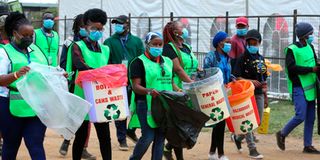Breaking News: At least 10 feared to have drowned in Makueni river
Ecological protocols to be monitored in Naivasha rally

Environment officers collect garbage at the Equator Rally’s Kenya Wildlife Service Training Institute Service Park in Naivasha on April 22, 2021 during scrutineering, free practice and installation of tracking devices ahead of the African Rally Championship round to be held from April 23.
What you need to know:
- He, however, assured that all the vehicles participating in the calendar event were within the required levels.
- John Gitonga, an environmentalist, said motorsport was the first sporting body to pioneer the environmental approach.
Environmental experts on Thursday assured that this weekend’s Equator Rally will strictly adhere to the ecological protocols.
The Equator rally is a precursor to the Word Rally Championship (WRC) Safari Rally scheduled for June 24 to 27.
Briefing the media at the Equator Rally Naivasha Service Park yesterday, WRC Safari Rally chief environmental officer Peris Njoroge committed to a sustainable event in terms of environmental conservation.
She decried high littering tendencies among the spectators whenever a major event happens, promising to provide bins and bin bags in all the strategic areas including the service park.
However, this weekend’s Equator Rally will be closed to the public.
“Towards this end, we have stationed environmental marshals in all key areas of competition and licensed waste contractors,” revealed Njoroge.
The environmental experts also divulged that they have taken care of hazardous waste spillage by providing spill kit and mats.
She said at least eight marshals, who will be stationed at the High Density Area, have been tested for Covid-19 in strict adherence to the rallying procedures that have been put in place.
Njoroge acknowledged the importance of the weekend’s event, saying they have an environmental code in accordance with the Federation Internationale de l’Automobile (FIA) requirements.
“We have now developed the codes and it is time to check if they are working and how we can implement them. In the June event, we shall definitely do better,” assured Njoroge.
Delving into the codes, she said it was like a yardstick to establish how they are managing the environment in a motorsport event like road clearance, fire breaks, voicing the importance of mitigating against such factors.
“In the environmental code, we have to show how we are also moderating carbon emission,” she added.
Njoroge said they have already achieved a one star rating by showing commitment and having an environmental policy. She divulged that they were going for a two star accreditation that will be achieved by implementing what is already in the action plan, terming the Equator Rally a baseline.
“Eventually we shall go for three star for the best environmental practices with the FIA environment and sustainability team expected to conduct an audit to ensure compliance of the regulations,” added Njoroge.
To attain the set out environmental best practices, she said three experts from the National Environment Management Authority (NEMA) have been co-opted into the sporting event to help them achieve their goal of three star ratings by 2022.
Noise level meters
On his part, Ibrahim Otieno and environmental expert they were looking at noise levels and measuring the intensity of the sound in accordance to Nema regulations and WRC allowable decibels.
“At the scrutineering point we are actually doing noise measurement using noise level meters and giving recommendation for vehicles exceeding the recommended decibels,” he said.
He, however, assured that all the vehicles participating in the calendar event were within the required levels.
John Gitonga, an environmentalist, said motorsport was the first sporting body to pioneer the environmental approach.




